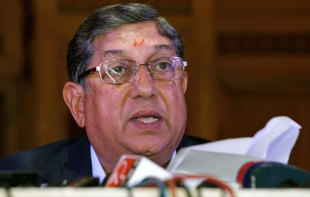BCCI shying away from governance - experts

Several corporate governance and legal experts believe that BCCI officials' repeated calls to "let the law take its course" in the IPL corruption scandal is an abdication of administrative responsibility masked by a falling back on the legal process.
TV Mohandas Pai, former board member of Indian software giant Infosys and chairman of Manipal Global Education Services, says that in the best practices of corporate governance an organisation would "hold itself out to be transparent and well-governed and then the legal action is taken." In the current situation, by Pai's standard, this best practice required Srinivasan to first stand down as BCCI president and then allow the three-member commission set up by the Indian board to take its decision against his son-in-law.
In professionally-run corporations, Pai - who speaks from experience as a former chief financial officer of Infosys - said in an email to ESPNcricinfo, "administration action is first taken to clear the ground for investigation so that the truth is found out."
In Srinivasan's case, Pai said, "the basic charge here is that an insider, Gurunath, leaked confidential information to outsiders, traded on the same and benefited/lost money." As an insider, Gurunath, was "facilitated in terms of access by the president Srinivasan."
Even if he was merely an "enthusiast," Gurunath was seen in the dugouts and Pai said, "(had) held himself out openly in the presence of the president as being deeply associated with Chennai Super Kings and for all purposes was the face of the CSK. Without this relationship he would have no position and no access. Even if there is no direct charge against Srinivasan, by his conduct he has been compromised."
Lawyer YP Singh, a former officer with the Indian police and in the Central Bureau of Investigation (India's federal investigative agency), said it was necessary that a clear distinction be made between legal and administration action and the level of proof required by both.
Singh, who has dealt with high-profile cases of financial fraud, said legal action required "beyond reasonable doubt" before issuing a judgement and finding a person guilty. "You need beyond reasonable doubt to send someone to jail.
Administrative action does not require 'beyond reasonable doubt'. Administrative action can be taken at any time." It required, he said, what the legal community referred to as, "the preponderance of probability." (The "degree" or the "likelihood" of the incident taking place is a bit lower as compared to beyond reasonable doubt.)
During his Kolkata press conference, Srinivasan's defence of his refusal to stand down hinged on the fact that he had committed no offence and there was a legal process in place. Through this defence, Singh said, the BCCI was trying to take administrative action, "after the investigation is complete ... that is legally impossible. A thorough legal investigation takes years."
In such a situation, the administrative action required by the BCCI should have been thorough and speedy. To redress the BCCI's shortcomings as of now in this case, Pai said, "Srinivasan would need to resign or step down from his position or take a sabbatical, hand over power to a committee of directors who would handle the investigation and if the investigation by independent third party finds nothing against the president, then he can easily redeem his dented honour."
Corporate India rarely speaks ill of its peers, but there are suggestions that in this case Srinivasan, a successful corporate figure in Tamil Nadu, has trapped himself in an untenable situation. "As you rise in power, the standards of governance required by you have to go up," says one leader. "The enormity of the situation is dependent on the person involved in a wrong doing." It is why offences committed by the CEO of a firm as opposed to a junior-executive have a different impact. It is "logically impossible" for Srinivasan to "retain his authority when an investigation is on because he retains the power to subvert the process."
Srinivasan has, however, chosen to stay in power by deliberately detaching the administrative action required at a time like this from the Board and attaching it to the legal process. The BCCI has been unable to prevent him from doing so. Pai said, "By doing what he is doing Srinivasan has shown himself in poor light and BCCI has shown itself to be an institution of cronies."
Bringing out the "innocent till proven guilty" card often diverts from another vital truth. An individual remains accused until proven innocent.
Sharda Ugra is senior editor at ESPNcricinfo
